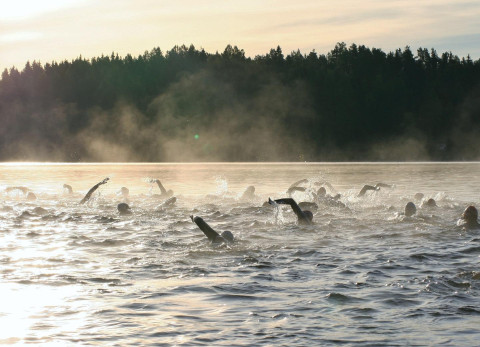Spreading the word about wild swimming... but safety first!

Spreading the word about wild swimming... but safety first!
Press inquiries
Swimming in nature is healthy. A group of British researchers have started a project to spread the word. They also want to offer swimmers guidance on the risks related to water quality and safety. Professor Suzanne McGowan from NIOO's department of Aquatic Ecology has joined the project as international co-investigator, focusing on water quality issues.
'Blue spaces' such as lakes, ponds and streams have well-documented benefits for mental and physical health and wellbeing, says Suzanne McGowan. "I have to start with a disclaimer: I don’t swim outdoors. It’s far too cold! But there is good evidence that cold water in particular has health benefits, and so a lot of swimmers enthusiastically continue throughout the winter months. Many swimmers enjoy the social aspects of inclusion in a swim club. So there are many good reasons to swim, but you do have to get over the fear of cold water if you live in northern Europe."
In Britain, 'wild swimming' has had a surge in popularity since the pandemic. But information about, and access to, open water locations tends to be local and disparate and not on the radar of wider communities. The Wild Swimming and Blue Spaces project wants to change that and encourage more people to reap the health benefits. It's a broad coalition of researchers from the universities of Nottingham and Cardiff, and organisations such as Swim England and the Black Swimming Association.
(Text continues below picture)
Assessing water quality
Central to the project will be an online survey aimed at both existing groups and prospective swimmers, to test their attitudes to and knowledge of the benefits of wild swimming. Also incuded is the question of how swimmers can make informed decisions about their safety, and the possible toxicity or contamination of wild swimming locations: factors that could seriously compromise those benefits.
That's where Suzanne McGowan comes in. "Swimmers may get an upset stomach if they ingest water contaminated with coliforms and other pathogens or with toxins from cyanobacteria. Exudates and microscopic bugs can also cause itchy skin. Water quality hazards are usually unpleasant rather than life-threatening, but they can be quite widespread. It's difficult for swimmers to assess how contaminated the water is before they swim, because microbes are invisible, and contamination varies depending on what's draining into the water and the time of year."
There's more information available in the Netherlands than in Britain, says McGowan. "In the Netherlands there are more than 200 inland water sites designated as bathing waters. This means they're monitored during the summer. In the UK, there are just four lake sites and two rivers which have bathing water status. So most UK swimmers are using waters where there is limited information on the water quality."
Developing a toolkit
Studying water quality has long been important for NIOO. "Researchers from my department were involved in developing the Blauwalgenprotocol, which guides managers in how to inspect bathing sites for cyanobacteria so that the Netherlands can adhere to the European Bathing Water Directive. Lake models developed by NIOO researchers can help to forecast the number of cyanobacteria-free swim days per year under different climate scenarios." Citizen Science projects are also helping to empower people to assess water quality, says McGowan, "They help us to establish which monitoring kits and tools may be useful for swimmers."
The information gathered by the Wild Swimming and Blue Spaces project is likewise aimed at developing a toolkit. "Health practitioners are increasingly using 'social prescribing' of exercise for a growing number of health conditions but to date there is no 'how-to' manual for doctors who may think that outdoor swimming could be beneficial for a patient. With this project, we hope to develop communication tools to help doctors give informed guidance to patients. The project includes linguists who are experienced in communication, and so it is nice example of where different disciplines need to work together to do make this project work."
Learning from each other
The two countries have a lot to learn from each other, believes McGowan. "The monitoring and designation of inland bathing waters is much more advanced in the Netherlands, and so provides a very nice example for the UK. The Bloomin’ Algae app allows citizen scientists to assess and report cyanobacterial blooms." The app was developed by the UK-Centre for Ecology and Hydrology, and has recently been adapted for use in the Netherlands with a Dutch language version.
"This project provides a vehicle for increased UK-Netherlands collaboration, using newly developed tools such as this app." And about the dangers? "People are already swimming in the outdoors in both the UK and the Netherlands. This project simply aims to help people assess when it may be more safe to swim and when they might want to be more cautious."

